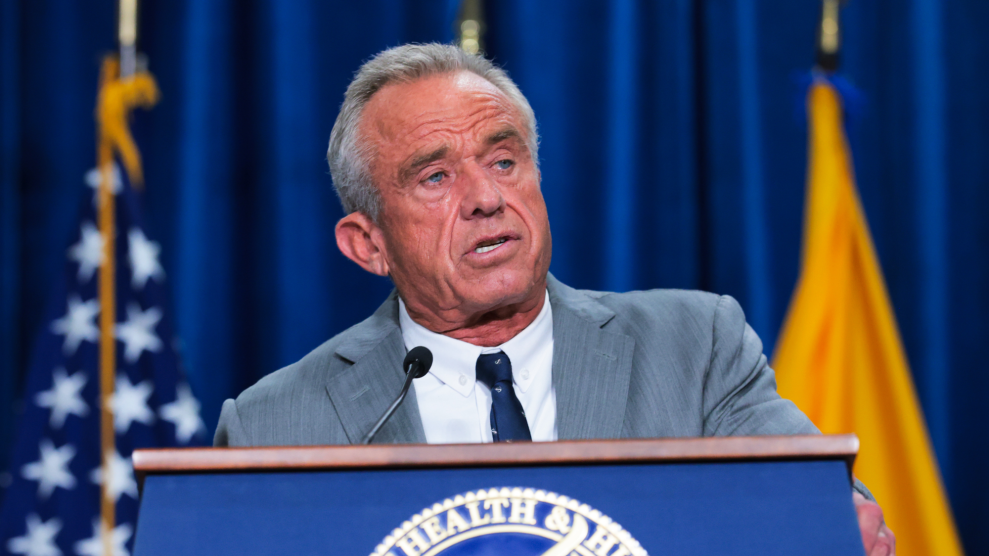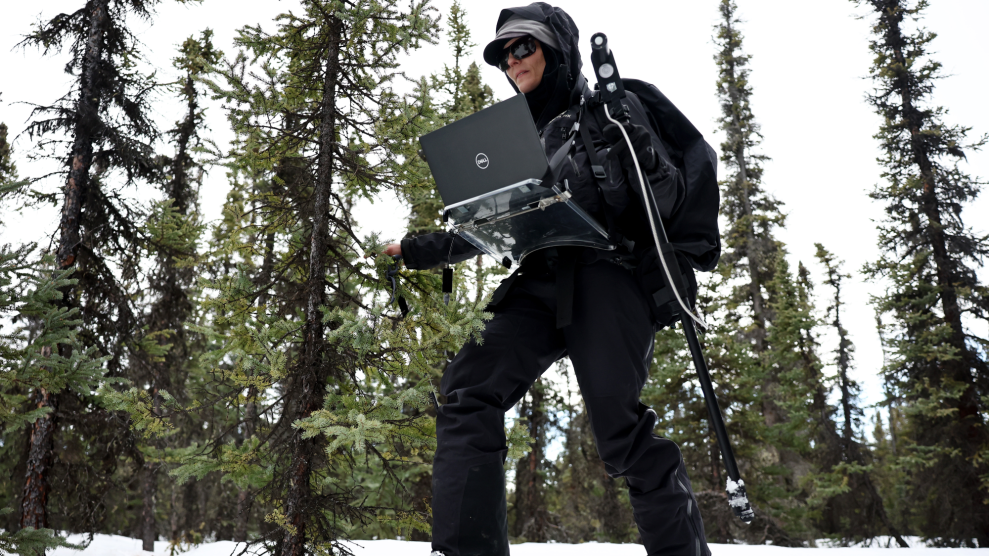MARTINSBURG, WV — “America’s proverbial drawers are down,” the preacher exclaimed. “Its backside is showing.” His speech was deliberate, grave for such a slapstick image, a joke that wasn’t meant for laughter, but within the packed sanctuary of Destiny Baptist Church on a working-class street in this average small town people laughed some anyway, as the preacher knew they would, for the same reason they pray: to lighten the load.
This was the Sunday after the storm, September 4. Six days of madness, of human creation either undone or finally exposed amid the fetid high water of New Orleans, and on the seventh day, restlessness. Great swathes of America found two sources of public communion, the church and CNN, and two rescuers in which to place their faith, Jesus and the cavalry. Armed force having come late or brutally to Katrina’s wretched exiles, and in all events helpless as salvation from a trouble so profound that neither poverty nor racism adequately names it, people looked to Jesus. Jesus must be sick of us.
Politicians impel us to prayer and make of it a degraded currency, a substitute for moral sentiment and dodge from responsibility. In the name of 9/11, Pray to Jesus. In the name of marriage, Pray to Jesus. Pray for our troops, and whichever team you like best on the football field. Pray for our bombs, our artillery, our way of life. Though which way is that, now that the decorative screen of general prosperity has been ripped away? Pray for elemental things—a drink of water, an income, a meaningful choice, shelter from the storm—because you’re on your own, Jack, and if you haven’t got, it’s your fault or God’s plan, probably both. As Katrina was bearing down on the Gulf, Louisiana Governor Kathleen Blanco urged the people to “pray it down” to a Category 2. As the waters rose she declared a Day of Prayer. Shielded from the suffering and the shame, President Bush asked God “to continue to bless America.” And on that same Sunday that Destiny’s Rev. C. Que Hickerson was raising a few earthy words to meet the mood of his congregation, Condoleeza Rice was in Bayou La Batre, Alabama, counseling, “The Lord is going to come on time, if we just wait.” Rice had been in New York shopping for shoes as people waited or died four days into the disaster. A week later presidentialprayerteam.org urged its visitors to ask the Lord for special blessings upon her, Bush, Michael Chertoff and Michael Brown, who was then still clinging to his FEMA job and could only “pray to God we don’t see those numbers,” meaning the tens of thousands of dead that government hurricane predictors had warned of as a possibility for years.
“Vanity of vanities,” the old prophet wrote. “All is vanity.”
The various image engineers and policy tweakers try to pull America’s pants up with sharp questions for the Bush team; with talk of the levees, their storied weakness and the diversion of monies meant to shore them up; with forecasts of global warming, hope in government spending and investigating commissions on emergency preparedness. What went wrong? Where were the communications, the buses, the water, the plan? Who’s accountable? More heads must roll! The president’s camp answers with yet another visit to the disaster zone, with a national address that twins God-bothering and an agenda portending as much opportunity for graft as for renewal. People place bets that the administration has tripped on its own contradictions, that the public good is at last a matter of political survival. We find sanctuary in the sentimental, replaying the stories of workers’ heroism, fresh starts, the kindness of strangers, and we keep count of the charity flows. These make us feel decent again.
But America’s backside is still showing, and liberals, progressives, what’s left of the left can take no comfort in George Bush’s embarrassment. The failed state he leads, which spends more on war material and security systems than any other in the world but cannot provide for the common welfare and defense, was not born on Inauguration Day 2001. Ronald Reagan is credited as its ideological father, but one way or another, unless forced to behave otherwise, the state has been dangerous to the poor, often lethal to the black and poor, as long as memory serves. Bill Clinton rode a stock market bubble, but chose to balance the budget rather than make good on his campaign pledge of “putting people first” by investing in infrastructure, sound cities, sound rural communities. No national progressive movement rose up in fury. No one thought inequality between the haves and have-nots could get worse than it was under Reagan; it did under Clinton. No one thought the real value of the minimum wage could be lower across eight years; it was under Clinton. No one thought the wealth disparity between black and white or the percentage of household debt or the prison-industrial complex or federal Death Row or the black incarceration rate or the number of uninsured could grow larger; they all did under Clinton. No one thought public housing residents could be stripped of due process or privacy rights. No one much cared about prisoners’ rights, severely diminished; or about welfare rights, pretty much eliminated, while millions of women and children were cut from the rolls and not even kept track of. Poverty, a pinched word—mass destitution in the shadow of obscene wealth is more accurate—is indeed a choice. America has chosen it again and again.
Now with government unmasked as a hollow giant is it any wonder that people hate it? Should anyone be shocked that New Orleanians who were ruined or on the edge long before the storm, whose closest government acquaintance was a police force that harassed them or worse, feared they would be shot down like dogs in its aftermath or handcuffed and separated forever from the only thing they owned? I was reminded of a child’s drawings I’d seen in New Orleans in 1997, the work of a friend’s 12-year-old son, which he’d pinned to his bedroom wall: his stick-figure father surrounded by a stick-figure SWAT team, then hovered over by a helicopter, finally black and red dead on the ground. It had been an ordinary police killing, nothing to garner wide attention, one of those things the nation seems to have decided some people can live with. Just before the storm New Orleans police swept the streets of alleged trespassers and “quality-of-life” offenders—poor people and, like the city, majority black. These, locked up and abandoned at the Orleans Parish Prison, tore the place apart in panic as the waters rose, swimming to an uncertain freedom if they were lucky, drowning in shit if not. Later the re-establishment of jail was said to signal a return to normalcy. Relief, like governance, came at the barrel of a gun.
A generation ago there might have been riots in America’s cities in response to the horrors Katrina exposed, but what seemed then like a purifying fire left a scorched earth across which money flowed everywhere but to the hands that needed it most, and power shifted barely a whit. Today’s polite, progressive calls for fully funding FEMA, or restoring its Cabinet status, or even launching a new New Deal, however reasonable in theory, seem like cruel hoaxes so long as the same rotten set-up reproduces itself. Already Bush’s recovery plan promises more power for himself, his cronies, the military; less affirmative action, environmental regulation; lower wages. Under the circumstance, why wouldn’t some people be crazy for Jesus?
For “He hath sent me to heal the brokenhearted, to preach deliverance to the captives, and recovering of sight to the blind, to set at liberty them that are bruised.”
Near the close of 2003, I met a man in Florence, South Carolina, who articulated plainer than anyone the logic of faith as a refuge from broken faith in the system. We were in a soul food restaurant where John Edwards was trolling for votes in the Black Belt in advance of the state’s Democratic presidential primary. Edwards was outlining a wonkish platform, having not yet come up with his “two Americas” line, but it probably wouldn’t have mattered if he had. This man, who was about 60 and wouldn’t give me his name, had joined the nonvoting half of America some two decades earlier. “Let me ask you,” he said gesturing to Edwards, “Can he stop war? Can he end poverty? Can he even love you?” I answered No, the way I’d answered so many people in the state who’d turned the tables on their interviewer and wondered if I thought any candidate gave a rip about the condition of their world, the one stretching from the neighborhoods of the almost-poor to the shacklands where the only running water was a hose through the window, the only insulation stacked newspapers up to the ceiling, the only heat-source a scary kerosene burner and the only shelter open in cracks to the earth below and the stars above. People in the shacklands were better off than those living in their cars, who were better off than those squatting in a broken-down school bus. Travel almost anywhere in America and you can find a version of this, though probably nowhere worse than in big city sacrifice zones like the old bottom lands of New Orleans, the Southern Black Belt and Appalachia. Edwards never would excoriate the nation’s accommodation to that reality, and the subject would not be raised in the general election, for which the Democrats’ big strategic idea was “write off the South.” Having satisfied himself that even fine-sounding politicians would leave his fate to his own devices and the hand of the Lord, the fellow in Florence had decided simply to cut out the middle man.
Almost two years later, what Marx called “the sigh of the oppressed” is heavy among us. Its institutional expression, the churches, synagogues and mosques, may offer consolation and charity but are no better placed than the state in its current form to address the source of misery. Popular organizations began regrouping within a week of the catastrophe, seeing this rightly as one of those pivot points in history where, awed by nature and our own failure to create the good society, people must make a future with a human face. It is “a hope not hopeless but unhopeful,” as WEB DuBois saw a century ago, as another black body is retrieved from the muck and vultures swoop in to profit off disaster.
















